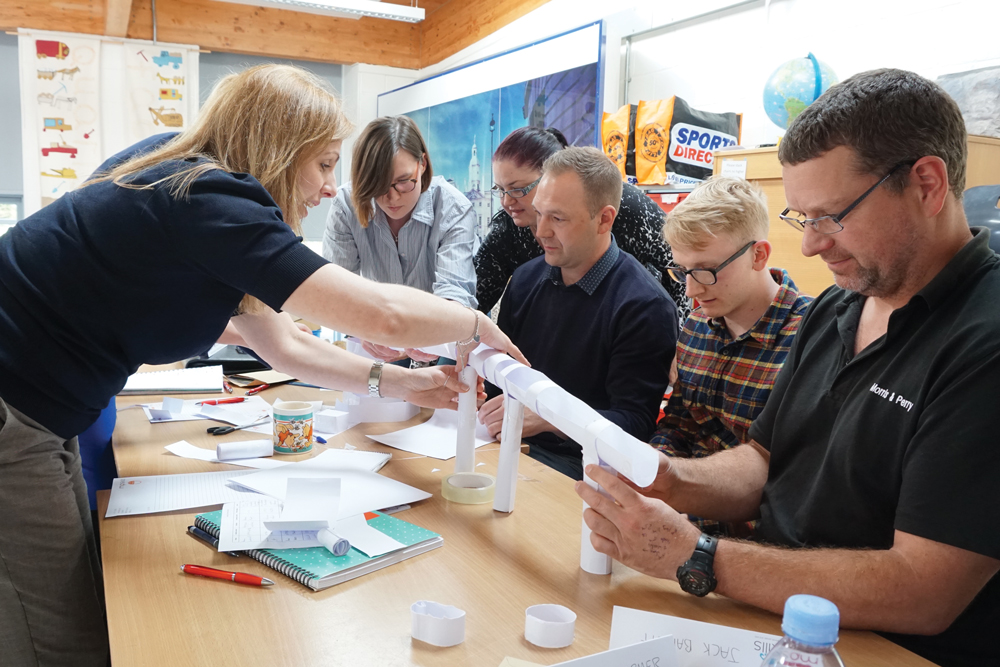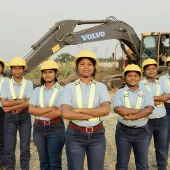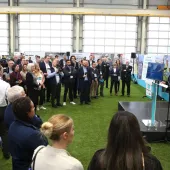Minerals Matter - Addressing the Skills Shortage

First published in the October 2018 issue of Quarry Management as Minerals Matter
Focusing on the future for everyone
It is no secret that many sectors, including the mineral products, mining and extractives sector, are facing a skills gap crisis unlike anything that has ever been seen before. A recent Labour Market Information (LMI) report from MP Futures, part of MPQC, found the average age of someone working in extractives is around 55 years old. Those within the 18–34 age bracket currently make up just 17% of personnel, and over the next 10 years the industry is facing a skills time bomb with many skilled employees retiring. For an industry that supplies vital products and a 16% share of the UK’s economy, this is bad news for everyone, especially considering all the products that would not exist without mineral extraction.
The skills gap crisis would be easier to understand if there was not an abundance of opportunities or new apprenticeships for the taking, or even if employers were not recognizing the issue. But most organizations have vacancies and want to hire people (one employer has reported having 100 vacancies).
Anthony Elgey, general manager of MP Futures, paints a clear picture of why those in the sector should act now to avoid being put on the back foot as the skills crisis progresses.
‘Change is inevitable, and it’s coming from both outside and inside the sector for corporations of all sizes,’ he explained. ‘The United Nations Goals for Sustainable Development has identified the mining and extractives industry as falling within the ‘Risk Nexus’, meaning that despite a strong correlation with delivering goals and the business opportunities therein, the risks are potentially more powerful than the positive growth drivers.
‘Following this, it is only a matter of time until governmental legislation or the changing business environment forces the hand of organizations to become reactive, when we need to be proactive if we are to be successful.’
If the trickling sands of time are not enough of a pressing call to action, the fact that an aging workforce is not a concern exclusive to the mineral products, mining and extractives sector should also be motivating decision-makers to be more proactive. Other science, technology, engineering and maths (STEM) industries are already streets ahead in their proactive communications strategies to entice young people, and competition for the future workforce is hotting up; engineering, for example, needs a 1.8 million share of the new employee market by 2025 and is a far more obvious industry than mineral products.
Making the mineral products, mining and extractives industry attractive to young people appears to be a key issue in the general lack of interest in the sector, despite employers offering a large and diverse selection of career paths. However, this is not through any lack of willingness on the part of employers, as many have indicated an interest in offering work experience. Unfortunately, not enough is being done to translate this interest into action. Only 39% of companies are actively promoting themselves to young people, and less than 25% have any contact with educational establishments.
‘We have a need to not only mitigate our own inherent disadvantages as a sector when it comes to attracting young people, but now we will also be facing intense competition from other sectors that are facing a similar predicament,’ continued Mr Elgey. ‘What our LMI indicated is that many employers are open to the idea of work experience, but are perhaps struggling to translate this into something tangible, coherent and strategic, which is where our sector-wide project, Minerals Matter, comes in.’
Perhaps in part due to the age of the workforce, the mineral products, mining and extractives sector has not been as fast at modernizing its approaches as some competitor sectors, which contributes to misconceptions of the sector being dusty and old-fangled. Social media is by far the most popular channel for reaching young people, as are other types of shorter-form digital content, such as video.
According to Ofcom, of those within the average age group of key decision-makers, only 59% are likely to have a personal social media profile, let alone actively use it or understand how social media can be applied to strategic digital communications. Considering that social media is the leading source of information for the younger generations, it becomes more important that the sector makes itself known in other ways and maximizes other routes to reach young people.
As part of the Mineral Products Qualifications Council (MPQC), MP Futures is also responsible for developing and maintaining industry National Occupational Standards (NOS) and apprenticeships, and acts as the standard-setting organization for the sector. Following advice from MPQC’s Future Leaders Forum, made up of young employees within the sector, MP Futures launched Minerals Matter. This project helps employers to engage with local schools, colleges and universities to promote the sector, dispel myths and demonstrate the diverse and engaging career options available.
One of the ways Minerals Matter does this is by engaging the existing workforce in STEM teaching and training them to become an industry ambassador, with the express aim of engaging with young people. This type of engagement is highly valued by schools with 93% of secondary establishments utilizing ambassadors from industry, and it creates a supply chain of potential employees by inspiring a local audience who have yet to make their career choices.
The kind of activities that ambassadors can undertake covers a broad spectrum of interactions ranging from mock interviews, site visits, careers talks and presentations to science fairs, mentoring and even remote interviews via Skype. Caitlin Minshall, an apprentice analyst at Aggregate Industries, has been mentoring a cohort of young people undertaking a British Science Association CREST Award, and, from her workplace, was able to hold a session with a school nearly 70 miles away through Skype.
‘It was a really easy process to get set up and in contact with the school,’ explained Ms Minshall. ‘I really enjoyed mentoring these students. It reminded me of things I had done, and I felt I could relate well to them. It fitted in well with my work schedule and the school’s, and we could still interact as we would face to face. Overall, it was a really rewarding experience and I thoroughly enjoyed helping out.’
One of the joys of becoming an ambassador is how easy the process is; the induction training is delivered free by MPQC and the commitment is just one activity per year, although many volunteers quickly get the bug and find being an industry ambassador extremely rewarding.
Moreover, ambassador sessions provide the chance for organizations to promote themselves directly to potential employees and develop stronger links to local communities and educational establishments. This is something that is becoming more important with the imminent introduction of T Levels, which have an increased focus on work placements.
However, the real indication of the project’s impact will be an influx of fresh talent to the sector, and whilst it is still very early days, things look promising; a new apprentice who was inspired to apply for a role following a quarry tour and presentation has already been hired through activities supported by Minerals Matter, and an enquiry has been received by another young person wanting an apprenticeship in the sector.
Despite its relatively recent inception, the Minerals Matter project has already engaged with more than 1,300 students and with industry ambassadors from 22 different companies across the sector, and these figures are growing weekly. Industry ambassadors do not need to be directors, scholars or graduates; anyone who is passionate about the industry and what they do can join the project, including those at SME organizations (who currently make up 42% of the industry ambassador team), big-name industry leaders or the self-employed and retired. The key is plenty of enthusiasm and a passion for the industry.
The industry must invest in the next generation now if it is to survive the next decade and continue delivering the infrastructure projects and vital products that build the modern world. This is a fact recognized by everyone, especially with the UK’s impending exit from the European Union, which will see another employee supply chain at best complicated, at worst cut off. Despite the praiseworthy accomplishments of Minerals Matter so far, Anthony Elgey is urging the whole sector to step up its game.
‘Minerals Matter is fully supported by the sector’s employers, trade bodies and professional institutions, such as the Institute of Quarrying. We are committed to helping employers raise awareness of the diverse and rewarding careers they offer and maximize every opportunity to promote the sector to teachers, parents and young people.
‘We have been a key business partner to the employers in the sector developing the new apprenticeships standards, and thanks to all this hard work we are becoming more attractive to young people seeking careers where they can make a real difference to the world. The new apprenticeships means we can now offer high-quality training with vocational qualifications to ensure quality, transferability and career progression.
‘MP Futures and Minerals Matter are helping dispel the myths and misconceptions about the sector, improving the sector’s social standing. It’s easy to see why it is so widely supported, and more importantly, it’s working.’
For more information on the Minerals Matter project or details on becoming an industry STEM ambassador, email: David.underhill@mp-qc.co.uk
- Subscribe to Quarry Management, the monthly journal for the mineral products industry, to read articles before they appear on Agg-Net.com








